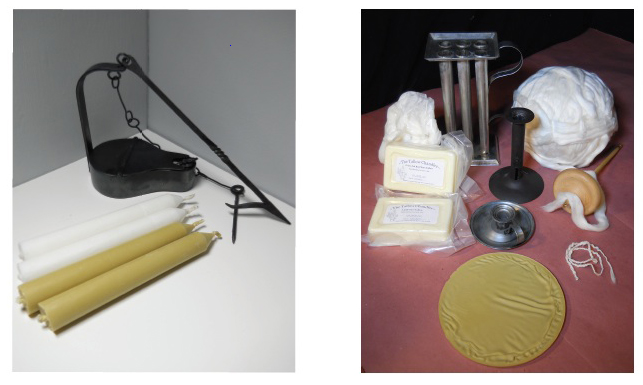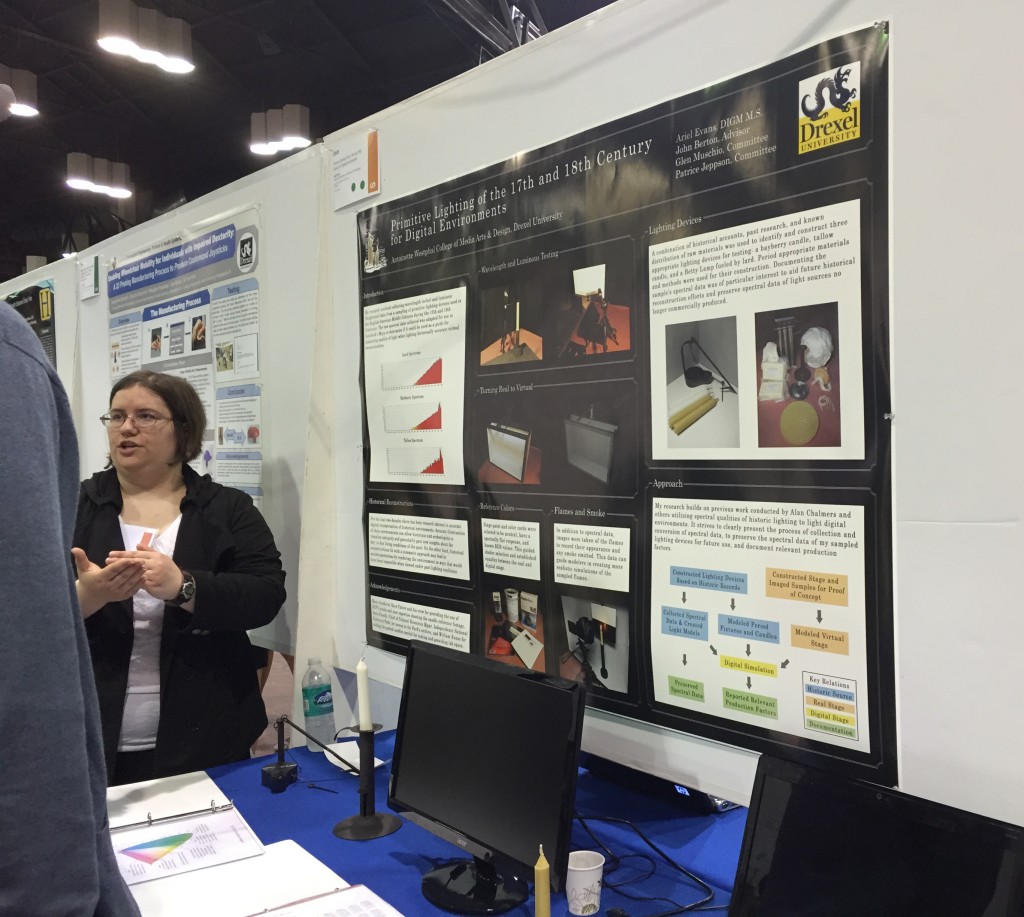June 2015 – Artifact of the Month
To Artifact of the Month Index
To PAF Home
Shining Light on ‘Light in the Past’:
Illumination for Virtual Archaeological Site Reconstructions
as an Example of Experimental Archaeology

Current research by MA Degree Candidate Ariel Evans (Department of Media Arts, Drexel University’s Antoinette Westphal School of Media Arts and Design) is designed to help make digital reconstructions of the past — including archaeological sites — more accurate. Evans is identifying and virtually recreating the light spectra qualities of bayberry candles, tallow candles, and Betty Lamps fueled by lard. Archaeologists often find evidence of the use of these and other 17th and 18th century lighting devices in historical archaeology sites. (Photos, courtesy of A. Evans, from “Primitive Lighting of the 17th and 18th Centuries for Digital Environments”, an Award Winning poster Evans presented at the 2015 Drexel University Research Day.)
Experimental Archaeology (known to some as Reconstruction Archaeology) is a scientific subfield of archaeological study that attempts to replicate, reconstruct, or reproduce either the physical processes of archaeological site mechanics or the social behaviors of ancient peoples using information from discovered artifacts. Current research by Ariel Evans, a Drexel University Media Arts Master’s Degree student, involves cutting-edge Virtual Experimental Archaeology. Evans is helping make digital reconstructions of the past more accurate by identifying and virtually recreating the light spectra qualities typical available in the past. The resulting data provides a useful resource standard for simulating quality of light in creating digital (computer-based) environments, including those used for interpreting archaeological sites (i.e., online exhibits, computer game platforms, and even cinematography).

(Left) Wavelengths (color) and luminous data (brightness) collected by Ariel Evans from a sample of modern recreated 17th and 18th Century Lighting Devices -a bayberry candle, a tallow candle, and a Betty Lamp fueled by lard. (Chart graphs courtesy of A. Evans, adapted from Evans’ 1st-Place, award winning Poster, “Primitive Lighting of the 17th and 18th Centuries for Digital Environments”, presented at the 2015 Drexel University Research Day.)
Evans’ research, conducted under the direction of Advisor John Berton, specifically involves examining and collecting wavelengths (color) and luminous data (brightness) of lighting devices commonly used in the 17th and 18th century along the eastern US seaboard — namely bayberry candles, tallow candles, and Betty Lamps that were fueled by lard. She employs modern but accurate reproductions of these lighting devices in researching their historical period light spectrums.
Current virtual interpretations of interior archaeological site reconstructions are generally presented with the illumination characteristics (re lighting quality) of natural daylight or of today’s modern incandescent and or LED lightbulbs. This introduces a false historical reality into virtual archaeological site reproductions. Evans’ virtual experimental archaeology research provides important data for making digital reconstructions of archaeological sites more accurate.
This write up, contributed to the Philadelphia Archaeological Forum by Patrice L. Jeppson, Ph.D. on 05/31/15, draws upon the Award-Winning research poster, “Primitive Lighting of the 17th and 18th Centuries for Digital Environments”, created by Ariel Evans for the 2015 Drexel University Research Day.
To Artifact of the Month Index
To PAF Home
by admin
